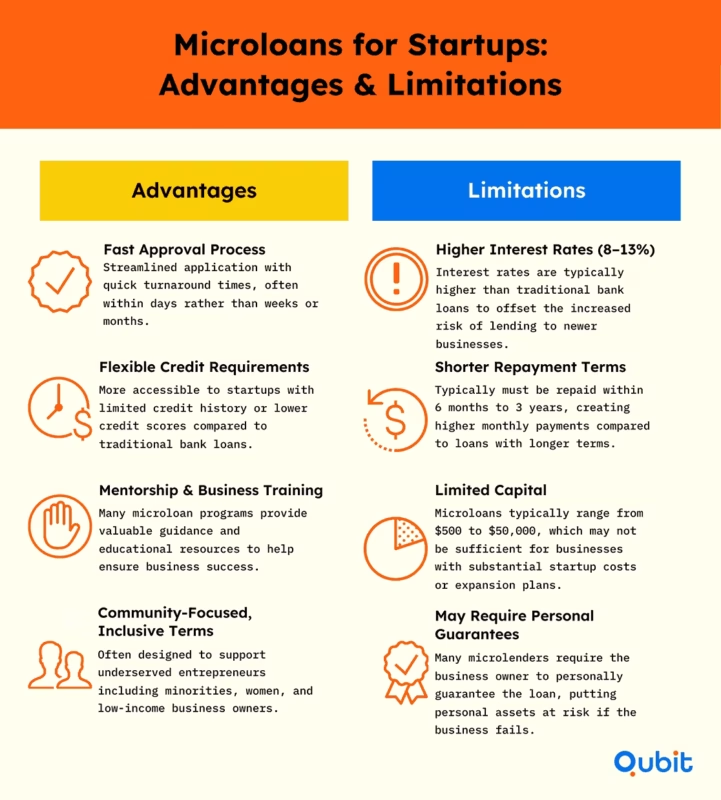Microloans don’t sound like much at first—until you realize they can range from $500 to $50,000 and are driving a global market expected to surge by 2025. For founders with limited credit history, this kind of capital often fills the gap when traditional funding sources fall short.
This post explores loans for start up businesses that don’t require long credit lines or institutional backers. You’ll see how CDFIs (Community Development Financial Institutions) and microfinance providers step in, especially when options like small business loans for startups feel out of reach.
We’ll break down key providers, show how the application process works, and compare these tools to other paths—including bootstrapping strategies for startups, which take a self-funded route.
What You Need to Know About Microloans
While traditional banks tend to avoid high-risk early-stage founders, microloans are largely issued by organizations with a mission: get capital into the hands of entrepreneurs who’ve been overlooked. That includes:
CDFIs that prioritize community impact over profit
Nonprofit lenders like Grameen America or Accion Opportunity Fund
SBA microlenders that offer U.S. government-backed options to startup owners
Peer-to-peer platforms such as Kiva, where individual lenders support small ventures
What makes these lenders stand out isn’t just their willingness to lend, but how they lend. Many offer more flexible underwriting criteria, allowing for lower credit scores, limited collateral, or alternative income documentation. When timelines feel slow, plan around how corporates invest in startups to keep momentum steady.
Why Microloans Could Be Perfect for Your Startup
Securing funding for start-up businesses can be challenging, especially for entrepreneurs with limited collateral or short credit histories. Microloans offer a practical solution, providing accessible financing to startups that might not meet traditional bank loan requirements. These loans often come with additional benefits, such as mentorship and financial training, empowering founders to build sustainable businesses.
A growing number of microlenders are adopting relaxed credit requirements, making microloan accessibility a lifeline for underserved entrepreneurs. Compared to conventional small business loans for startups, microloans frequently feature lower fees and flexible repayment terms, easing financial strain during the critical early stages of business growth.
The Best Microloan Providers for Startups
Finding the right microloan provider can make all the difference for startups seeking funding for their business journey. Each provider offers unique benefits tailored to specific needs, ensuring entrepreneurs can access the resources they require.
The SBA Microloan Program stands out with its competitive terms, offering loans up to $50,000. This program is ideal for startups looking for manageable repayment options and smaller loan amounts to kickstart their operations. On the other hand, LiftFund caters to a broader range of funding needs, providing microloans from $500 to $500,000. Its flexible terms make it a great choice for businesses requiring diverse funding solutions.
For entrepreneurs with limited credit histories, Ascendus specializes in empowering individuals by offering accessible financing options. Microloans help unlock capital early on, but relationship-driven strategies bring something more. You’ll see how strategic partnerships for startup funding fits into broader funding plans that mix finance with shared growth.
Quick Overview of Top Microlenders
Microlenders play a vital role in offering loans for start up businesses, providing accessible financing options with manageable terms. Interest rates for microloans typically range from 8% to 13%, making them a competitive choice for entrepreneurs seeking affordable funding.
Additionally, the average loan amount is approximately $13,000, catering to small-scale needs while remaining well under $50,000. These metrics highlight the flexibility and practicality of microloan providers in supporting emerging businesses. Whether you're exploring interest rate options or evaluating loan sizes, microlenders offer tailored solutions to help startups thrive.
How Microloans Help You Grow Your Business
Microloans provide a practical solution for entrepreneurs seeking loans for start up businesses. The application process is simplified through intermediary lenders, who not only facilitate funding but also offer consultation services to guide applicants. Once approved, borrowers benefit from dedicated loan servicing centers, which assist with repayment schedules, account inquiries, and ongoing support.
For specific loan-related questions, such as account balances or due dates, borrowers can access resources like the Loan Servicing centers provided by the SBA. These services ensure a smooth experience, allowing businesses to focus on growth.
Weighing the Pros and Cons of Microloans
Microloans offer a unique financial solution for entrepreneurs seeking loans for start up businesses. On the positive side, they provide rapid access to funds, often paired with valuable mentoring services to guide new business owners. These features can be especially beneficial for startups needing immediate capital and expert advice.
However, microloans come with challenges. Borrowers may face higher interest rates compared to traditional loans, and repayment terms are typically shorter, which can strain cash flow. Understanding these trade-offs is essential for making informed financial decisions tailored to your business needs.

Steps to Secure a Microloan for Your Business
Securing a microloan can be a straightforward process when you understand the necessary steps. Start by ensuring your business meets the eligibility criteria, which often includes demonstrating its viability through a solid business plan or proof of revenue. While microloan applications typically require minimal documentation, lenders prioritize evidence that your business can sustain itself and repay the loan.
Collateral or a personal guarantee may be required to mitigate lending risks. Prepare to offer assets or personal commitments to support your application. Finally, compare lender options to find terms that align with your needs. Exploring the benefits of incubators and accelerators can also provide complementary support systems to enhance your business’s growth alongside microloan funding.
Microloans offer a practical solution for small businesses seeking funding to grow or stabilize operations. These loans can be used for essential purposes like purchasing inventory, launching marketing campaigns, or expanding product lines.
Real Microloan Success Stories That Sparked Business Growth
Miriam Kattumuri, founder of Miriam's Earthen Cookware, utilized an SBA microloan to scale her eco-friendly cookware business. After years of bootstrapping, the microloan enabled her to establish a pottery manufacturing operation, keeping overhead costs low and maintaining product quality.
Jacqueline Mukacyemayire from Rwanda transformed her dressmaking business with the help of a microloan from VisionFund. Starting with one sewing machine, she expanded her operations to employ 15 people and opened multiple clothing shops. VisionFund not only provided the loan but also offered training on financial systems and cash flow management. Read more about Jacqueline's journey.
Baasanpagam, a former employee at a large bakery in Mongolia, opened her own bakery by purchasing a bread-making oven with a microloan from VisionFund. With a second loan, she built a heating system. Two years later, her bakery became one of the three biggest in her community. Discover Baasanpagam's story.
Reach Out to a Microloan Intermediary
Connecting with nonprofit microloan intermediaries can be a game-changer for startups seeking loans for start up businesses. These organizations not only provide access to funding but also offer tailored mentorship and training to help entrepreneurs succeed. By working closely with these intermediaries, startups gain valuable insights into the funding process and receive ongoing support to refine their business strategies. This relationship fosters growth and ensures that startups are equipped with the tools they need to thrive in competitive markets.
Your Guide to Repaying Microloans
Repaying microloans effectively can set your business on a path to financial growth. These loans typically come with repayment terms extending up to seven years, offering flexibility for start-up businesses to manage their finances. Prioritizing timely repayments not only ensures smoother cash flow but also contributes to building strong business credit. This improved credit profile can open doors to larger loans in the future, empowering your business to scale. Responsible repayment is key to long-term financial success.
Support Options for Current Microloan Borrowers
A strong borrowing history with microlenders can open doors to greater financial opportunities. Borrowers who consistently meet repayment terms often find it easier to secure future loans for start up businesses. This positive track record not only builds trust but also increases the likelihood of approval for progressively higher loan limits. By demonstrating reliability, borrowers can position themselves for long-term success and access to larger funding options tailored to their growing needs.
Other Financing Options Beyond Microloans
Exploring funding alternatives can open new doors for startups. Options like revenue-based financing allow businesses to repay investors through a percentage of their monthly revenue, offering flexibility. Bootstrapping, where founders use personal savings or reinvest profits, is another viable route that minimizes external dependency. Strategic partnerships can also provide financial support while fostering collaborative growth.
Before committing to any funding method, startups should evaluate their unique needs and long-term goals. Microloans offer one path, but they’re part of a larger shift away from traditional finance. A broader look at alternative funding for startups shows how founders are mixing methods to stay agile.
Insights from revenue-based financing explained provide a perspective on adaptable funding models, enriching your understanding of how microloans compare as a financing option. With their flexibility and accessibility, these platforms are becoming a go-to solution for entrepreneurs seeking innovative ways to fund their ventures.
Best Financing Platforms for Startup Funding
Not all loans for start up businesses come through traditional lenders. Online platforms have created new ways to access capital—each with its own strengths. Some focus on speed, others on flexibility or investor reach. Here's a quick look at the most popular options:
1. Funding Circle: A Reliable Financing Partner
Known for its peer-to-peer model, Funding Circle provides vetted, fast approvals tailored to small business needs.
2. OnDeck: Quick Financing Solutions for Startups
Offers short-term loans and lines of credit, with a focus on rapid underwriting and disbursement.
3. Qubit Capital
If you're unsure which path fits your startup best, Qubit Capital can help you evaluate the right funding match through strategic guidance and lender introductions. We work with early-stage teams to navigate options—whether it's marketplace loans, investor networks, or something in between.
4. Lendio: Streamlined Financing for Small Businesses
Lendio connects startups to a wide network of lenders, acting as a loan marketplace with guided support.
5. Kickstarter: Crowdfunding for Your Big Idea
Great for pre-revenue projects, Kickstarter enables public backers to support product-driven startups.
6. AngelList: Connecting Startups with Investors
More than funding, AngelList helps startups tap into angel investor networks and early equity backers.
Conclusion
Empowering startups begins with understanding the diverse funding options available. Microloans and Community Development Financial Institutions (CDFIs) offer accessible solutions that can transform ideas into thriving businesses. By aligning funding strategies with specific business needs, entrepreneurs can build a solid foundation for growth while maintaining financial sustainability.
Taking actionable steps toward securing the right funding is crucial. Whether exploring microloans, researching CDFIs, or evaluating other financial avenues, the key lies in making informed decisions tailored to your venture's goals.
If you're ready to take your startup to the next level, we invite you to explore our Fundraising Assistance service for tailored support. Let's secure your future together.
Key Takeaways
- Microloans provide accessible, short-term funding ranging from $500 to $50,000.
- They are especially valuable for startups with limited collateral or credit history.
- A variety of providers cater to different needs, from government-backed programs to community-focused lenders.
- Comparative analysis between microloans and online financing platforms helps in making informed funding decisions.
- Proper planning, documentation, and mentorship significantly enhance funding success.
Frequently asked Questions
Can microloans be used to start a business?
Absolutely, microloans are a practical solution for startups seeking initial funding. Entrepreneurs can utilize these loans to purchase inventory, invest in marketing efforts, or cover other essential expenses. Their flexibility makes them ideal for businesses with limited credit history.






